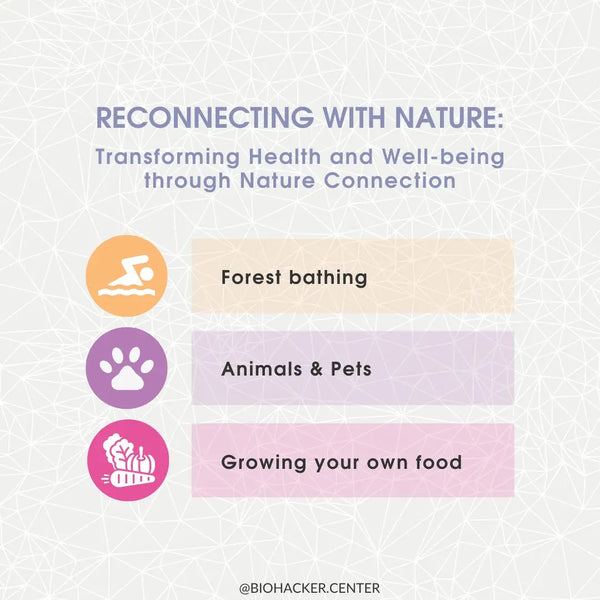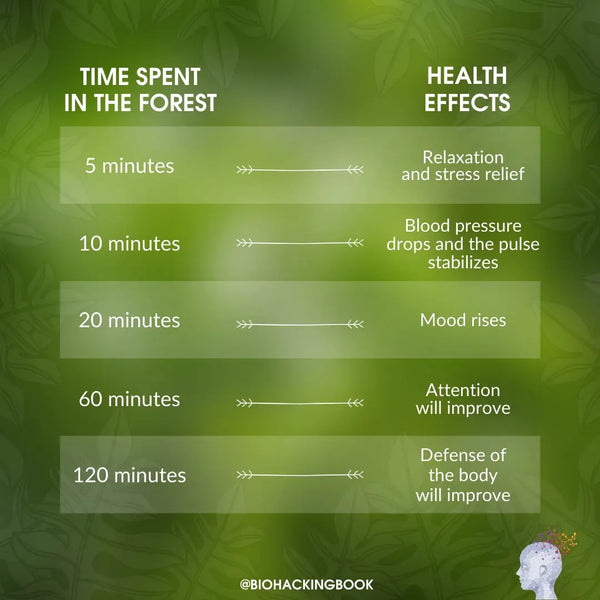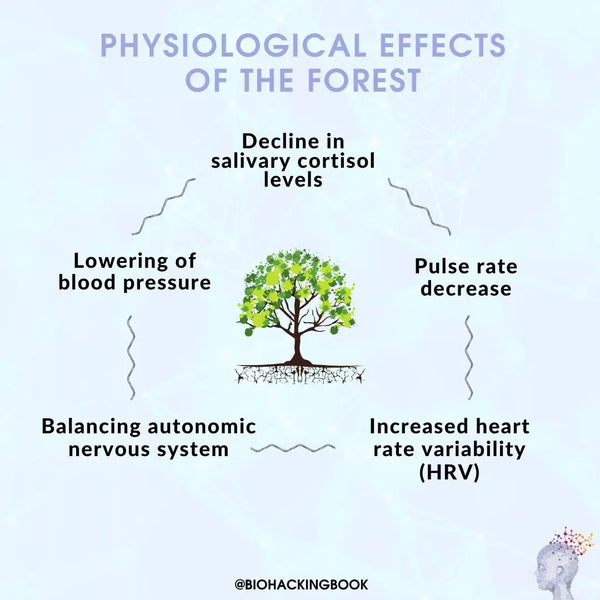In a fast-paced, technology-driven world, there is a growing recognition of the importance of reconnecting with nature for our overall well-being. Scientific studies continue to uncover the profound effects of immersing ourselves in natural environments on our physical, mental, and emotional health. From alleviating stress and anxiety to enhancing immune function and fostering creativity, nature offers many healing benefits. This article covers forest bathing, everyday nature connection, growing one's food, connecting with animals and the health benefits of nature.

Introduction
Man has been a part of nature since the birth of the species. Unfortunately, many people become alienated from nature with urbanization and technological development. As early as 1984, American psychologist Craig Brod coined the term technostress to refer to the stress of technology and computers in humans.
People generally prefer nature over urban environments, but little is known about what people think about when they see these environments. Based on a study done in 2018, associations with natural and sunny environments were more positive than those with urban and overcast environments. Natural scenes seem to elicit mainly positively valenced associations, whereas associations with urban environments are mixed.
For example, most Finns still consider nature to be a very important issue in their lives, even though the majority of Finns now live in an urban environment. According to a study prepared by the Finnish Forest Research Institute, only about five percent of Finns feel that they belong to genuine urban people in terms of the attractiveness of the urban environment. Correspondingly, 19% of the population feel that they belong to genuine natural people. In any case, about 95% of the population finds nature attractive.
Forest Bathing
Many studies have shown that people value natural areas more than the built environment. In particular, trees, plants, water bodies, altitude fluctuations, and, in general, good care of areas are traits that please people. The health effects of a unified natural forest, which mainly contains the sounds of nature, are more pronounced than in a park or built-up green area.

In 2016, an extensive review of 52 studies was published in Japan, according to which the observed physiological effects of nature and forest include:
- Decreased salivary cortisol levels
- Decrease in pulse rate
- Decreased blood pressure
- Increase in heart rate variability (HRV)
- Balancing of the autonomic nervous system
In Japan, patients are prescribed shinrin-yoku or forest bathing to balance hectic and dense urban life. Literally, this means “internalizing the atmosphere of the whole forest with all the senses.”

If we cannot go to nature, let nature come to us. In the workplace, the presence of natural elements (eg greenery, green walls, and other green areas) significantly reduces perceived stress and increases job satisfaction. Studies also show that the view of nature reduces work-related stress and increases job satisfaction. Listening to the sounds of nature can be brought to the work environment, for example, with anti-noise headphones. Similarly, viewing nature images on a computer helps to balance the autonomic nervous system after a mentally challenging situation.
Preliminary studies have found that barefoot walking and standing, or grounding or earthing, can reduce inflammation, reduce oxidative stress, improve blood circulation, and lower stress levels. Staying longer in the woods and even overnight reduces stress and lowers the inflammatory state of the body. Sleeping grounded has also been shown to lower cortisol levels and equalize cortisol secretion during the day.
To conclude, a large British population study published in 2019 found that spending at least 120 minutes a week in nature is associated with good health and wellbeing. This is just 2 hours, which can be achieved quite easily. It did not matter how 120 mins of nature contact a week was achieved (e.g. one long vs. several shorter visits/week). The key is to actually spend time in the nature.
Growing your own food
Growing at least some of your food and having a garden can immensely increase your connection to nature and thus also increase happiness. Also, gardeners’ aesthetic experiences can generate meaning that encourages them to further engage with activities leading to positive health outcomes.
Growing your vegetables is also a great way to reduce grocery costs, improve the quality of your food, and have more nutrient-dense foods in your diet. Based on a small study in California, USA, participants who underwent an urban home garden program reported greater food access, increased consumption of fresh produce, a shift towards home cooking, and decreased fast food consumption. They also reported improved physical activity, mental health and stress management.

Image: Dr. Olli Sovijärvi's home garden from summer 2022.
In children, gardening is very beneficial in their physical, cognitive, and motor development. Gardening can also be a great opportunity for parents and children to spend uninterrupted quality time together.
One important aspect of growing your own foods is in times of crisis. During the COVID-19 pandemic and resulting lockdown measures, home food growing was associated with improved food access and well-being as well as lower levels of food insecurity.
Getting your hands “dirty” in soil has been our evolutionary trait. The potential for soil exposure as an environmental source of epigenetic signals which influence the function of our genome in determining health and disease is great.
Several human studies have suggested marked changes in DNA methylation patterns associated with exposure to airborne particulates from anthropogenic sources. A soil-derived bacterium, Mycobacterium vaccae, which has anti-inflammatory and immunoregulatory properties, is a potentially useful countermeasure against negative outcomes to stressors and anxiety-related behaviors, based on studies done in mice.
Animals and pets
According to current knowledge, the history of pets dates back to about 12,000 years (10,000 BC). A grave has been found from this era, where a dog buried with it has been found in the human armpit. Animals have been bred as pets for ages and used for hunting and agriculture.
From a stress management perspective, keeping a pet is known to increase empathy, reduce anxiety, and improve mood, among other things. In addition, pets have been found to lower circulating stress-related markers (such as cortisol, adrenaline, and noradrenaline), lower heart rates, and increase heart rate variability (HRV). The stress-reducing physiological effect is still noticeable even if the pet is not of one's own. It has also been observed in children that the stress response to various stimuli is markedly reduced when the dog is close. In the elderly, the presence of a pet reduces boredom and increases overall well-being.
In addition to companionship and assistance, the domestic animal can improve immunity and prevent autoimmune diseases and allergies. This is thought to be because domestic animals effectively spread bacteria in the habitat among family members. For example, studies show that the incidence of asthma is lower in children who have grown up with domestic animals. Researchers have linked animal husbandry with a more diverse intestinal bacterial population and, thus, better overall health.
The COVID-19 pandemic brought out multiple studies on pets’ effects on mental health during the lockdown, especially when other human connections were limited. The results showed that in comparison with people without animals, pet owners had significantly higher levels of mental well-being – they felt they could cope better with adverse situations and experienced significantly more positive emotions during the lockdown.
A 2021 systematic review found mixed results on pets’ effect on their owner’s mental health. While absolute numbers of studies demonstrate a positive impact compared to a negative effect on mental health, the general results trend was mixed. This is most likely due to differences in study quality and because mental health is multifactorial. Anecdotally, however, many pet owners report a positive effect on their mental health.
Dogs are the most popular pet globally, owned by 33% of respondents, with cats coming in second at 23%. Dog ownership contributes to hedonic (pleasure) and eudaimonic (purpose) well-being in multiple ways, including supporting owners through periods of poor mental health and providing purpose. However, the burden of responsibility and owner and dog characteristics can create challenges.
///





